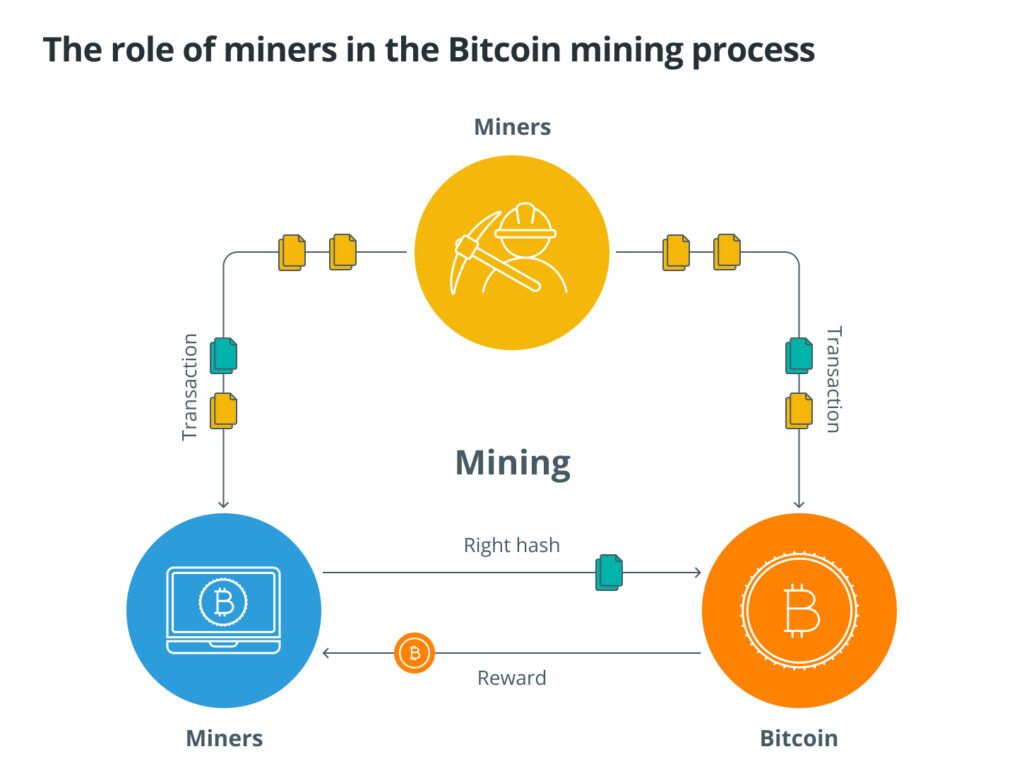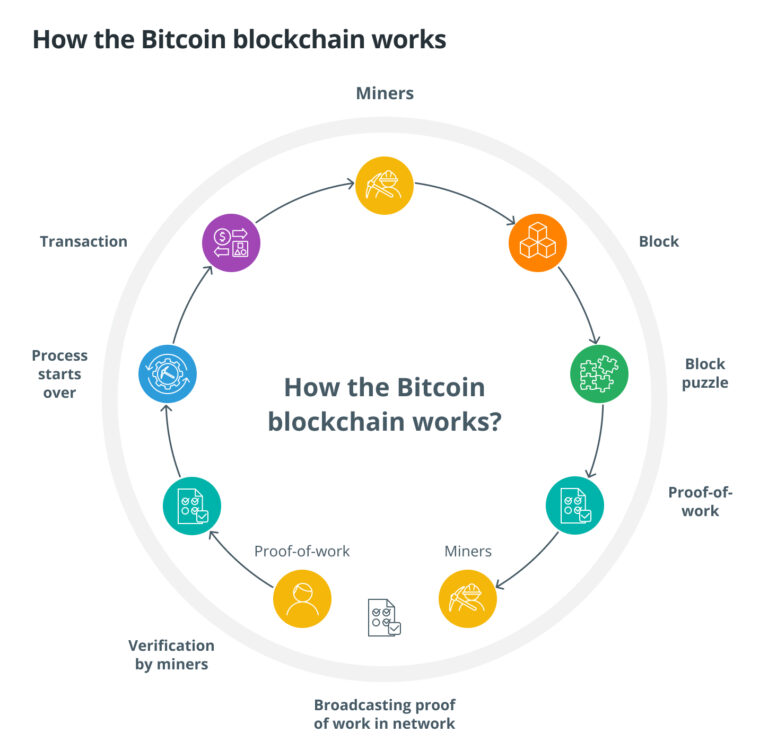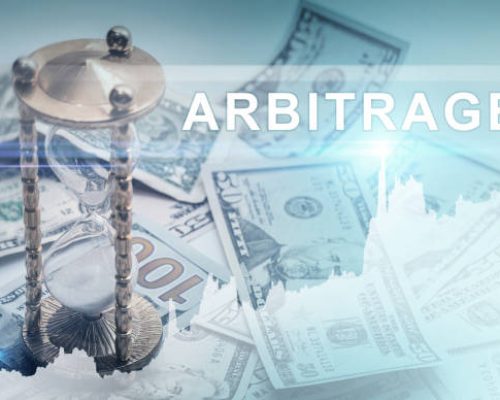Bitcoin nodes and Bitcoin miners are vital elements of the Bitcoin blockchain. Although these terms are sometimes used interchangeably, they represent distinct types of nodes on the network. Full nodes and miners have unique roles and responsibilities.
Every Bitcoin node plays a crucial role in the network by validating transactions and blocks, thereby upholding the integrity and seamless operation of the blockchain. In contrast, miners go beyond validation and engage in the proof-of-work (PoW) process to propagate new blocks to the network. Without miners, new transactions would not be appended to the blockchain.
What is a full Bitcoin node?
A full Bitcoin node is like a computer that stores all the important information needed to run and manage the Bitcoin network. It keeps a complete and up-to-date copy of all the Bitcoin transactions. These nodes check if the transactions are real and follow the rules, and then share this information with others on the network. They also help group transactions into blocks for miners to work on.
Full Bitcoin nodes play a big part in making sure everything is working correctly. They make sure that the miners follow the rules and don’t have too much power. They also help protect the network from certain types of attacks. Even though they’re really important, they don’t get rewards like miners do.
What is a Bitcoin mining node?
A Bitcoin mining node is a special kind of node that not only does everything a full node does but also works on creating new blocks for the Bitcoin network. These mining nodes compete with each other to solve difficult math problems and, if successful, they get new Bitcoins as a reward. This process needs a lot of computer power and energy. After checking transactions, mining nodes propose new blocks to the network and make sure they follow all the rules.

Types of Bitcoin nodes
Light nodes
Light nodes, also referred to as simplified payment verification (SPV) nodes, operate using a compact version of Bitcoin software that stores only block headers from the blockchain. To access the complete data of a block, light nodes need to connect to full nodes. This setup enables them to verify transactions without requiring the entire blockchain, making them suitable for devices with limited storage or processing power, such as mobile wallets.
Lightning nodes
The Lightning Network, an overlay on the Bitcoin network, facilitates faster and less expensive Bitcoin transactions managed by Lightning nodes. These nodes establish a web of payment channels that enable off-chain transactions, which are subsequently settled on the Bitcoin blockchain.
Archive nodes
Archive nodes, also known as full archival nodes, maintain a complete record of the blockchain, encompassing all past transactions. This comprehensive data repository allows them to furnish historical information and assist other nodes in synchronizing or validating the blockchain’s historical records.
Pruned nodes
Pruned nodes retain the historical data of the network but within a specified size limit. Upon reaching this limit, they “prune” older data to accommodate the latest blocks.
Mining pool nodes
Mining pool nodes oversee the combined resources of groups of miners. If a mining pool successfully validates a block, the resulting reward is equitably distributed among the participants in the pool.
Light nodes
Light nodes, also referred to as simplified payment verification (SPV) nodes, operate using a compact version of Bitcoin software that stores only block headers from the blockchain. To access the complete data of a block, light nodes need to connect to full nodes. This setup enables them to verify transactions without requiring the entire blockchain, making them suitable for devices with limited storage or processing power, such as mobile wallets.
Lightning nodes
The Lightning Network, an overlay on the Bitcoin network, facilitates faster and less expensive Bitcoin transactions managed by Lightning nodes. These nodes establish a web of payment channels that enable off-chain transactions, which are subsequently settled on the Bitcoin blockchain.
Archive nodes
Archive nodes, also known as full archival nodes, maintain a complete record of the blockchain, encompassing all past transactions. This comprehensive data repository allows them to furnish historical information and assist other nodes in synchronizing or validating the blockchain’s historical records.
Pruned nodes
Pruned nodes retain the historical data of the network but within a specified size limit. Upon reaching this limit, they “prune” older data to accommodate the latest blocks.
Mining pool nodes
Mining pool nodes oversee the combined resources of groups of miners. If a mining pool successfully validates a block, the resulting reward is equitably distributed among the participants in the pool.

How Bitcoin miners and full nodes work together
Bitcoin nodes and miners are interdependent. They rely on each other to perform the following process:
Transaction validation and broadcasting
Full nodes pick up transactions, validate them and broadcast them to the network. This validation includes ensuring the transactions comply with the Bitcoin protocol rules and if the inputs to the transactions have not been previously spent.
Mempool
The term mempool refers to where validated, unconfirmed transactions wait until they are picked up by miners to be included in a new block. Each node maintains its own version of the mempool.
Transaction selection by miners
Miners pick up transactions and perform further validation, grouping transactions to include the previous block’s hash and a new nonce (random number used once), creating a unique new block that is “hashed” with the protocol’s algorithm. The process of grouping transactions involves creating a Merkle tree, which efficiently summarizes all the transactions in the block.

Critical roles of Bitcoin Nodes
It is impossible to overestimate the significance of Bitcoin nodes or the influence that miners and nodes have on the network. By broadcasting and validating transactions, reaching consensus via the Bitcoin consensus mechanism, and safely appending new, unchangeable blocks to the blockchain, these fundamental components enable the blockchain to function. Nodes serve as hubs for communication and go-betweens for users, facilitating the transmission of blocks and transactions over the network and efficiently routing data.
The trustless integrity, security, and decentralized nature of the Bitcoin blockchain are vitally dependent on nodes. By carrying out their respective roles and ensuring the smooth operation of the network as a whole, Bitcoin miners and nodes increase the robustness and security of the ecosystem.










1 Comment
Ut cumque quae minus numquam quia. Quo commodi eos eum a et excepturi. Vitae non accusantium minus cumque hic. Minus sequi ea iusto qui. A dicta voluptas aut qui et. Ratione consequuntur necessitatibus excepturi cum. Eius magni odio architecto non. Non amet qui ea et ipsa. Id adipisci et illo inventore est nobis incidunt. Corrupti aut voluptate quo deserunt totam. Et ipsa voluptas qui possimus ut et ut. Minima qui dolores aut dolor repudiandae repellendus officiis est. Tempora qui fugit autem possimus quidem. Architecto est id eaque voluptatem iste saepe fugit. In inventore blanditiis autem alias qui eaque. Vel doloremque doloribus aut sequi autem et reiciendis. Omnis tenetur explicabo excepturi. Quia quae voluptatem deleniti labore commodi. Optio dolorem sit laudantium autem voluptatibus dolores. Ut cumque est ut non iure nemo.